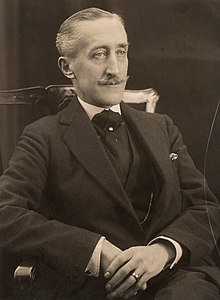Lord Willingdon
|
Major the Most Honourable the Marquess of Willingdon GCSI GCMG GCIE GBE PC |
|
|---|---|
 |
|
| 22nd Viceroy and Governor-General of India | |
|
In office 18 April 1931 – 18 April 1936 |
|
| Monarch |
George V Edward VIII |
| Prime Minister |
Ramsay MacDonald Stanley Baldwin |
| Preceded by | The Lord Irwin |
| Succeeded by | The Marquess of Linlithgow |
| 13th Governor General of Canada | |
|
In office 5 August 1926 – 4 April 1931 |
|
| Monarch | George V |
| Prime Minister |
Canadian • W. L. M. King • R. B. Bennett British • Stanley Baldwin • Ramsay MacDonald |
| Preceded by | The Viscount Byng of Vimy |
| Succeeded by | The Earl of Bessborough |
| More... | |
| Personal details | |
| Born | 12 September 1866 |
| Died | 12 August 1941 (aged 74) Ebury Street, Westminster, London, England |
| Spouse(s) | Marie Adelaide Freeman-Thomas |
| Education | Eton College |
| Profession | Politician |
|
Viceregal styles of The Viscount Willingdon (1926–1931) then The Earl of Willingdon (1931–1936) |
|
|---|---|
 |
|
| Reference style | His Excellency The Right Honourable (in Canada, also) Son Excellence le très honorable |
| Spoken style | Your Excellency (in Canada, also) Votre Excellence |
| Alternative style | Sir (in Canada, also) Monsieur |
Major Freeman Freeman-Thomas, 1st Marquess of Willingdon GCSI GCMG GCIE GBE PC (12 September 1866 – 12 August 1941) was a British Liberal politician and administrator who served as Governor General of Canada, the 13th since Canadian Confederation, and as Viceroy and Governor-General of India, the country's 22nd.
Freeman-Thomas was born in England and educated at Eton College and then the University of Cambridge before serving for 15 years in the Sussex Artillery. He then entered the diplomatic and political fields, acting as aide-de-camp to his father-in-law when the latter was Governor of Victoria, and in 1900 was elected to the British House of Commons. He thereafter occupied a variety of government posts, including secretary to the British prime minister and, after being raised to the peerage as Lord Willingdon, as Lord-in-Waiting to King George V. From 1913 on, Willingdon held gubernatorial and viceregal offices throughout the British Empire, starting with the governorship of Bombay and then the governorship of Madras, before he was in 1926 appointed as Canadian governor general by the King, on the recommendation of Prime Minister of the United Kingdom Stanley Baldwin, to replace The Viscount Byng of Vimy as viceroy, and he occupied the post until succeeded by The Earl of Bessborough in 1931. Willingdon was immediately thereafter appointed as Viceroy and Governor-General of India by the King, on the advice of British prime minister Ramsay MacDonald, to replace The Lord Irwin, and he served in the post until succeeded by The Marquess of Linlithgow in 1936.
...
Wikipedia
